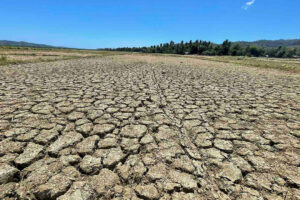




January Economic Update: Growth slows, prices rise
 DOWNLOAD
DOWNLOAD

Inflation Update: Up, up, and away?
 DOWNLOAD
DOWNLOAD

Quarterly Economic Growth Release: Growth takes on a slower pace
 DOWNLOAD
DOWNLOAD


‘Temperature shock’ poses persistent inflation risk

Rising temperatures and climate shocks such as the El Niño weather event could fan inflationary pressures and reduce economic output growth over the next few years, according to a study by economists at the Bangko Sentral ng Pilipinas (BSP).
In a discussion paper titled “Macroeconomic effects of temperature shocks in the Philippines: Evidence from impulse responses by local projections,” BSP economists said the inflationary effect of temperature shocks was “significantly” persistent up to the fourth year after a shock.
“A 1-degree Celsius increase in annual mean temperature leads to persistent inflationary pressures up to four years, with a cumulative increase of 0.77 percentage point (ppt) in headline inflation after the initial shock,” they said.
The paper, authored by BSP Monetary Policy Research Group economists Jean Christine A. Armas, Ranelle Jasmin L. Asi, Dyan Rose L. Mandap, and Gabrielle Roanne L. Moral, also showed that the effect of temperature shocks could increase headline inflation by 0.46 ppt in the short term and up to 0.81 ppt in the long term.
The study also showed that El Niño Southern Oscillation (ENSO) events also stoke inflation.
“Short-term inflationary effects of temperature shocks on headline, food, and non-food are deeper in magnitude at 0.49 ppt, 0.69 ppt, and 0.49 ppt, respectively, when we incorporated dummy variables for episodes of ENSO events,” the BSP economists said.
The Philippines is currently in the midst of an El Niño weather event, which has caused dry spells that disrupted agricultural output and fueled food inflation. El Niño is expected to persist through the second quarter.
Headline inflation accelerated for the first time in five months to 3.4% in February as prices of food continued to rise. Rice inflation, which accounts for almost half of the headline print, surged to 23.7% in February — the fastest since the 24.6% in February 2009.
The BSP earlier said that inflation could temporarily accelerate above the 2-4% target range in the second quarter due to the “adverse impact of El Niño weather conditions on agricultural production and positive base effects.” The BSP expects inflation to average 3.6% this year.
In the study, BSP economists noted that temperature shocks more heavily impact the prices of food over non-food.
“Disaggregating the components of consumer prices, the results show that the inflationary impact of temperature shocks on food prices is deeper in magnitude and long-lasting in period at 0.79 ppt vis-a-vis the effect on non-food prices, which is rather small at 0.31 ppt and transitory up to 2 years only,” they said.
The BSP study also showed that inflationary effects from temperature shocks are more prevalent in Luzon.
“In the case of Luzon, where most of the regions are predominantly agricultural and have various industries including food processing and machinery production, temperature shocks affect the level of output in key production sectors, resulting in deeper magnitude of the inflationary effect,” they said.
Temperature shocks can also reduce economic growth.
“We find that, on the average, the short-run marginal impact of a 1-degree Celsius increase in the country’s annual mean temperature reduces aggregate output growth by 0.37 ppt,” the BSP economists said.
“The decline in output growth is larger at 0.47 ppt when we control for episodes of ENSO events vis-à-vis the 0.3 ppt drop in output growth after controlling for the occurrence of floods and storms.”
The study also showed that manufacturing and services sectors are “negatively affected” by an increase in mean temperature.
“However, we find that temperature shocks do not significantly affect labor productivity in heat-exposed industries such as construction, transportation, and manufacturing,” it added.
The study said that central banks will play a crucial role in managing the impact of climate change on price stability.
“On the one hand, the inflationary effects of temperature shocks in the short run are best addressed by the timely implementation of non-monetary policy interventions since monetary policy adjustment typically works with a lag,” they said.
“On the other hand, if inflation remains persistent and evidence of second-round effects materialized, the central bank will respond and adjust its policy interest rates accordingly.” — By Luisa Maria Jacinta C. Jocson, Reporter
This article originally appeared on bworldonline.com





 By BusinessWorld
By BusinessWorld